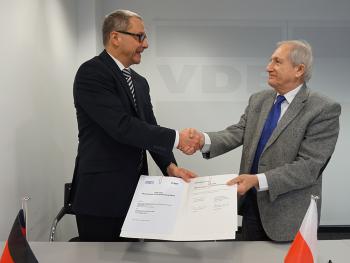Cooperation between PKN and DKE extended for the next 5 years

Between January 14 and 15 in Frankfurt took place a meeting of representatives of the Polish Committee for Standardization and the German Committee of Electrical Engineering, Electronics and Information Technologies DIN and VDE (DKE).
The aim of the meeting was to discuss the activities of the Technical Committee IEC/TC 27, whose secretariat is run by PKN, as well as common issues in the field of European standardization. The meeting served also as a good opportunity to sign a document prolonging the Memorandum of Understanding on standardization between PKN and DKE for another five years.
The memorandum was signed on January 15th of this year by Tomasz Schweitzer – the President of PKN and Michael Teigeler – the President of the Management Board of DKE. The MoU sets the rules for cooperation between PKN and DKE in the field of standardization and places great emphasis on mutual exchange of experience and expertise between both institutions. In addition to cooperation related to the standardization activities and exchange of information, the Memorandum allows to strengthen bilateral relations, among others due to the appointment of permanent representatives responsible for maintaining current contacts between the two institutions, as well as undertaking joint activities. One of the most important areas of cooperation specified in the document is the exchange of information on standardization work or other technical projects undertaken by PKN and DKE, as well as common identification of issues being of interest to both parties.
The PKN-DKE agreement serves not only both institutions, but also strengthens the strategic partnership that connects all national standardization bodies that are part of the European standardization organizations. It also creates conditions for increasing technical cooperation between the Republic of Poland and the Federal Republic of Germany, indirectly contributing to the elimination of technical barriers to trade.
